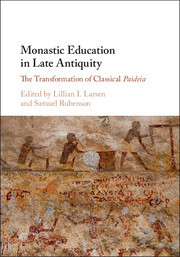Monastic Education in Late Antiquity The Transformation of Classical Paideia
Langue : Anglais
Coordonnateurs : Larsen Lillian I., Rubenson Samuel

Redefines the role assigned education in the history of monasticism, by re-situating monasticism in the history of education.
In re-examining the Christianization of the Roman Empire and subsequent transformation of Graeco-Roman classical culture, this volume challenges conventional ways of understanding both the history of Christian monasticism and the history of education. The chapters interrogate assumptions that have framed monastic practice as pedagogically unprecedented, with few obvious precursors and/or parallels. A number explore how both teaching and practice merge classical pedagogical structures with Christian sources and traditions. Others re-situate monasticism within a longer trajectory of educational and institutional frameworks, elucidating models that remain central to the preservation of both Greek and Latin literary culture, and the skills of reading and writing. Through re-examination of archaeological evidence and critical re-reading of signature monastic texts, each documents the degree to which monastic structures emerged in close alignment with urban, literate society, and retain established affinity with classical rhetorical and philosophical school traditions.
Part I. The Language of Education: 1. Early monasticism and the concept of a 'School' Samuel Rubenson; 2. Translating paideia: education in the Greek and Latin versions of the Life of Anthony Peter Gemeinhardt; 3. Paideia, piety and power: Emperors and Monks in Socrates' Church History Andreas Westergren; Part II. Elementary Education and Literacy: 4. The Educational and Cultural Background of Egyptian Monks Roger Bagnall; 5. 'Excavating the Excavations' of early monastic education Lillian I. Larsen; 6. Homer and Menandri Sententiae in Upper Egyptian monastic settings Anastasia Maravela; Part III. Grammar and Rhetoric: 7. The school of Didymus the blind in the light of the Tura find Blossom Stefaniw; 8. Affecting rhetoric: the adoption of Ethopoeia in Evagrius of Pontus' ascetic program Ellen Muehlberger; 9. Classical education in sixth century Coptic monasticism: the example of Rufus of Shotep Mark Sheridan; Part IV. Philosophy: 10. The virtue of being uneducated: attitudes towards classical paideia in early monasticism and ancient philosophy Henrik Rydell Johnsén; 11. Plato between school and cell: biography and competition in the fifth-century philosophical field Arthur Urbano; 12. Pythagorean traditions in Early Christian asceticism Daniele Pevarello; Part V. Manuscript and Literary Production: 13. Textual fluidity and authorial revision: the case of Cassian and Palladius Britt Dahlman; 14. Production, distribution, and ownership of books in the monasteries of Upper Egypt: the evidence of the Nag Hammadi Colophons Hugo Lundhaug and Lance Jenott; 15. Greek thought, Arabic culture: approaching the Arabic recensions of the Apophthegmata Patrum Jason Zaborowski.
Lillian I. Larsen is a Professor in the Department of Religious Studies at the University of Redlands, California. Her foundational re-reading of the desert fathers and mothers in light of ancient pedagogy grounds the work of the MOPAI research initiative.
Samuel Rubenson is a Professor in the Centre for Theology and Religious Studies at Lunds Universitet, Sweden. He has long been engaged in research on the letters of St Antony.
Samuel Rubenson is a Professor in the Centre for Theology and Religious Studies at Lunds Universitet, Sweden. He has long been engaged in research on the letters of St Antony.
Date de parution : 08-2018
Ouvrage de 408 p.
18x25.3 cm
Disponible chez l'éditeur (délai d'approvisionnement : 14 jours).
Prix indicatif 128,95 €
Ajouter au panierThème de Monastic Education in Late Antiquity :
© 2024 LAVOISIER S.A.S.



